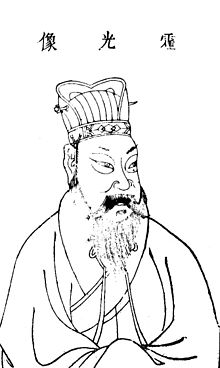Huo Guang
| Huo Guang | |||||
|---|---|---|---|---|---|
| Marquess of Bolu | |||||

Portrait of Huo Guang in Sancai Tuhui
|
|||||
| Marquess of Bolu | |||||
| Reign | 87–68 BC | ||||
| Successor | Huo Yu 霍禹 | ||||
| Born | Hedong, Pingyang County, Han | ||||
| Died | 68 BC | ||||
| Spouse | Lady Donglü Lady Xian |
||||
| Issue | Lady Huo Empress Huo Chengjun Huo Yu, Marquess of Bolu Lady Huo Lady Huo |
||||
|
|||||
| Father | Huo Zhongyu 霍仲孺 | ||||
| Posthumous name | |
|---|---|
| Xuancheng 宣成 Full posthumous title Marquess Xuancheng of Bolu 博陸宣成侯 |
Huo Guang (Chinese: 霍光; died 68 BC), courtesy name Zimeng (子孟), was a Western Han politician who was a rare example in Chinese history of a powerful official who deposed an emperor for the good of the state rather than to usurp the throne. He was the half-brother of renowned Han general Huo Qubing.
Huo's early career in Han government was not well documented, but it is known that as of 88 BC—near the end of Emperor Wu's reign, he was already a high-ranked official with dual titles of Fengche Duwei (奉車都尉) and Guanglu Dafu (光祿大夫). When Emperor Wu, near the end of his life, chose his youngest son Liu Fuling (later Emperor Zhao) as heir, he commissioned Huo, ethnically-Xiongnu official Jin Midi, and imperial guard commander Shangguan Jie (上官桀) as coregents, but with Huo effectively in command of the government, with the titles of dasima (大司馬) and dajiangjun (大將軍). When Emperor Wu died in 87 BC, Emperor Zhao, then eight years old, was left in the tutelage of Huo, Jin, and Shangguan. Emperor Wu's will created the three of them as marquesses, but all three declined.
Emperor Zhao, as the youngest son of Emperor Wu, drew jealousy from his older brothers, and in his reign there were multiple conspiracies. In 86 BC, a conspiracy involving Liu Dan (劉旦), Prince of Yan, and an elder son of Emperor Wu, was discovered, but the prince was not punished, presumably under Huo's decision, even though the other conspirators were executed.
In 85 BC, Huo was created the Marquess of Bowang (博望侯).
In the same year, Jin, a moderating influence in the coregency, died. After Jin's death, Shangguan became increasingly jealous of Huo's powers, even though the two had been great friends, and Huo had given his daughter in marriage to Shangguan's son Shangguan An (上官安). In 84 BC, as a ploy to further strengthen his powers, Shangguan Jie gave his granddaughter (also Huo's granddaughter), then age five, in marriage to the emperor, then age 11, and she was made empress in 83 BC.
...
Wikipedia
